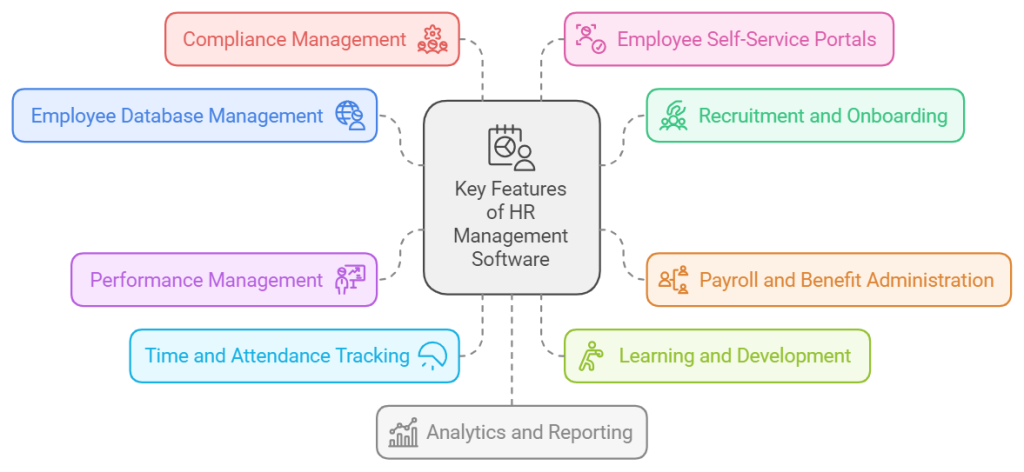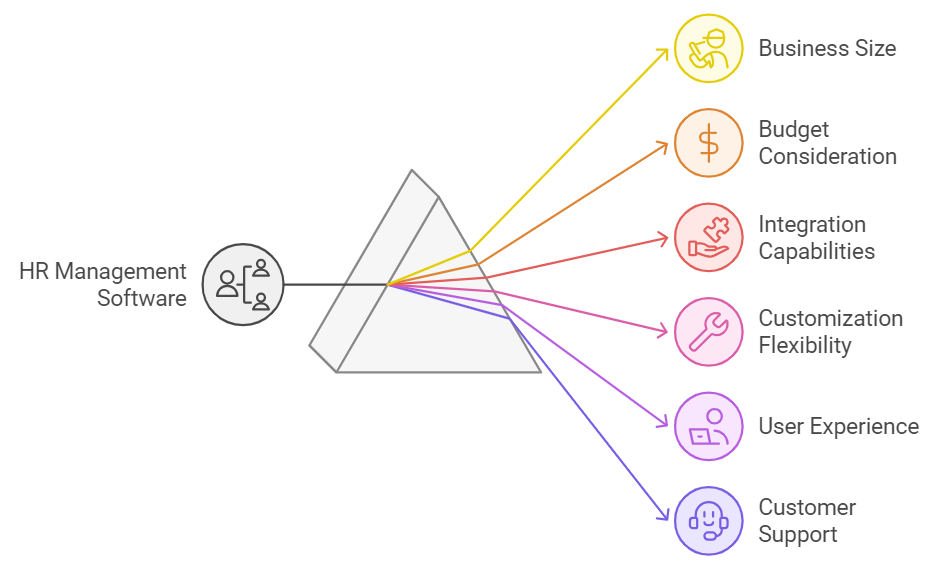Why Your Business Needs HR Management Software in 2024!

In today’s fast-paced and competitive business environment, managing human resources efficiently is crucial for organizational success. Human Resource Management Software (HRMS) has emerged as a key solution to streamline HR functions, improve employee engagement, and ensure compliance with labor regulations. This software automates and integrates various HR tasks, such as recruitment, payroll, performance management, and employee data tracking, enabling HR departments to operate more effectively.
What is HR Management Software?
HR management software is a suite of digital tools designed to assist businesses in managing and optimizing human resources operations. It centralizes and automates essential HR processes such as employee data management, recruitment, onboarding, payroll, performance evaluations, training, and compliance. This software reduces the administrative burden on HR teams, allowing them to focus on strategic initiatives like talent development, organizational culture, and employee engagement.
HRMS is typically cloud-based, which offers flexibility, scalability, and accessibility for businesses of all sizes. It often integrates with other business tools, such as accounting and payroll systems, ensuring that HR operations are aligned with broader company functions.
Key Features of HR Management Software
An effective HRMS offers a range of features that streamline HR tasks, improve accuracy, and promote efficiency. Some of the core features include:

1. Employee Database Management
At the heart of every HRMS is a centralized employee database that stores all essential employee information, such as personal details, employment history, and benefits. This database makes it easy to access and update employee records, ensuring data accuracy and consistency across the organization.
2. Recruitment and Onboarding
HR management software simplifies recruitment by automating job postings, applicant tracking, and resume management. Once candidates are hired, the onboarding process is also streamlined through automated workflows that handle offer letters, contracts, and new hire training. This reduces paperwork and ensures a smooth transition for new employees.
3. Payroll and Benefit Administration
Managing payroll can be a complex process, especially for larger organizations. HRMS automates payroll processing by calculating wages, deductions, and tax filings. It also manages employee benefits, such as health insurance and retirement plans, ensuring that these are properly administered and compliant with labor laws.
4. Performance Management
Performance evaluations and goal tracking are critical to employee development. HRMS allows managers to set objectives, track employee progress, and provide regular feedback. Some systems also support 360-degree feedback, where peers, subordinates, and supervisors evaluate an employee’s performance. This fosters continuous improvement and engagement.
5. Time and Attendance Tracking
HR management software often includes time-tracking features that monitor employee attendance, working hours, leave balances, and overtime. These systems can integrate with payroll to ensure accurate compensation based on time worked, reducing errors and administrative effort.
6. Learning and Development
Many HRMS platforms offer learning management systems (LMS) to support employee training and development. These tools provide access to online courses, track employee learning progress, and manage certifications. This encourages ongoing education and helps businesses keep their workforce skilled and competitive.
7. Compliance Management
Staying compliant with local, state, and federal labor regulations is critical for businesses to avoid legal penalties. HRMS helps manage compliance by automating reporting, maintaining employee records, and tracking changes in labor laws. This ensures that the organization remains compliant and up-to-date with regulatory requirements.
8. Employee Self-Service Portals
Modern HRMS includes self-service portals where employees can update personal information, access payslips, request time off, and enroll in benefits programs. This empowers employees by giving them control over their data and reduces the need for HR to manually process these requests.
9. Analytics and Reporting
HRMS offers advanced analytics and reporting features that provide insights into workforce trends, such as employee turnover, absenteeism, and productivity. These reports help HR professionals make data-driven decisions that improve overall organizational performance.
10. Mobile Accessibility
With the rise of remote work and mobile technology, HRMS platforms often offer mobile apps that allow HR teams and employees to access important information and complete tasks from anywhere. This enhances flexibility and ensures that HR operations continue uninterrupted, even in a distributed work environment.
Benefits of HR Management Software
Implementing HR management software can lead to numerous benefits for organizations, including:
1. Increased Efficiency
By automating routine tasks such as payroll, attendance tracking, and benefits management, HRMS significantly reduces the administrative workload. This allows HR professionals to focus on strategic initiatives that drive business growth, such as talent development and employee engagement.
2. Improved Accuracy
Manual HR processes are prone to errors, which can lead to costly mistakes in payroll, benefits administration, and compliance reporting. HRMS minimizes these errors by automating calculations and ensuring that data is consistently updated across the system.
3. Better Compliance
HR management software helps organizations stay compliant with labor laws by tracking regulatory changes and automating compliance reporting. This reduces the risk of non-compliance, which can result in hefty fines and damage to the company’s reputation.
4. Enhanced Employee Experience
Employee self-service portals and mobile accessibility give employees more control over their data and HR-related tasks. This not only improves their experience but also fosters a sense of empowerment and trust within the organization.
5. Data-Driven Decision Making
With robust analytics and reporting features, HRMS enables organizations to make informed decisions based on real-time data. HR professionals can identify trends, such as high employee turnover or low engagement, and implement strategies to address these issues.
6. Cost Savings
Although implementing an HRMS involves an initial investment, the long-term cost savings are significant. By automating HR processes, organizations reduce the need for manual labor, minimize errors, and improve productivity, all of which contribute to cost efficiency.
7. Scalability
HRMS platforms are scalable, meaning they can grow with your business. Whether you’re a small startup or a large enterprise, HR management software can be customized to meet your specific needs, ensuring that it continues to provide value as your organization evolves.
Types of HR Management Software
There are several types of HR management software, each catering to different business needs. The most common types include:
1. Human Resource Information System (HRIS)
HRIS focuses on the core administrative functions of HR, such as employee data management, payroll, and benefits administration. It provides a centralized platform for managing HR tasks and is typically used by organizations that need to streamline these processes.
2. Human Capital Management (HCM)
HCM software goes beyond the basic functions of an HRIS by focusing on the broader management of human capital. In addition to payroll and benefits, HCM includes performance management, employee development, and succession planning. It’s designed for businesses that want to take a more strategic approach to managing their workforce.
3. Applicant Tracking System (ATS)
ATS is a specialized type of HR software focused on the recruitment process. It automates job postings, tracks applicants, and manages resumes, making it easier for HR teams to find and hire the right candidates. ATS is often integrated with broader HR management systems.
4. Learning Management System (LMS)
LMS is a type of HR software designed to manage employee training and development. It provides access to online courses, tracks learning progress, and ensures that employees have the skills they need to succeed in their roles.
How to Choose the Right HR Management Software

Selecting the right HR management software for your business depends on several factors, including:
1. Business Size
Smaller businesses may need a simple HRMS with basic functions like payroll and employee data management, while larger enterprises may require more advanced features, such as performance management and compliance tracking.
2. Budget
Consider your budget when choosing HR management software. While some platforms offer a wide range of features, they may come with a higher price tag. Evaluate the cost against the value the software provides to ensure you’re making a wise investment.
3. Integration Capabilities
Ensure that the HRMS you choose can integrate with other business systems, such as accounting, payroll, and performance management software. This ensures a seamless flow of data across the organization.
4. Customization and Flexibility
Look for HRMS that can be customized to fit your specific business needs. Whether you need unique workflows, custom reports, or specific compliance features, the software should be flexible enough to accommodate these requirements.
5. User Experience
Choose software with an intuitive interface that’s easy for HR teams and employees to use. A user-friendly platform reduces the learning curve and ensures that everyone can quickly adopt the new system.
6. Customer Support
Select a vendor that offers reliable customer support, including implementation assistance, training resources, and ongoing troubleshooting. This ensures that any issues can be resolved quickly, minimizing disruptions to your HR operations.
Why Quikchex is the Best Fit HR Management Software
When it comes to selecting the right HR management software for your business, Quikchex stands out as a top contender. Designed with the modern workplace in mind, Quikchex integrates all essential HR functions into a single, user-friendly platform. Here’s why Quikchex is the best fit for managing your HR needs:
1. Comprehensive HR and Payroll Integration
Quikchex combines both HR management and payroll functionalities into one seamless system. From recruitment and employee onboarding to payroll processing and tax compliance, Quikchex covers all bases, eliminating the need for multiple platforms. This integration streamlines operations, reduces data entry errors, and ensures that your HR and payroll systems are always in sync.
2. User-Friendly Interface
One of Quikchex’s standout features is its intuitive interface. The software is designed to be easy to use, minimizing the learning curve for HR teams and employees alike. Whether you’re managing employee data, running payroll, or analyzing performance reports, Quikchex makes it easy to navigate the system and complete tasks efficiently.
3. Employee Self-Service Portals
Quikchex empowers employees by offering self-service portals where they can access their personal information, request time off, view payslips, and manage benefits. This reduces the burden on HR departments, allowing employees to handle many of their own HR-related tasks without needing to contact HR staff, thereby improving productivity.
4. Seamless Compliance Management
Compliance with labor laws and tax regulations can be a major challenge for businesses. Quikchex simplifies compliance by automating regulatory updates, tax filings, and reporting. The software ensures that your business stays up to date with ever-changing labor laws, minimizing the risk of non-compliance and costly penalties.
5. Powerful Analytics and Reporting Tools
Quikchex offers advanced reporting and analytics features that provide valuable insights into workforce trends, performance metrics, and payroll costs. These reports help HR teams make informed decisions, identify potential issues, and optimize their workforce management strategies. The ability to generate custom reports ensures that you have access to the specific data you need.
6. Scalability for Growing Businesses
As your business grows, so do your HR and payroll needs. Quikchex is designed to scale with your organization, offering flexibility to add new employees, handle complex payroll structures, and manage multiple locations. Whether you’re a small startup or a large enterprise, Quikchex can adapt to meet your evolving requirements.
7. Time and Attendance Tracking
Quikchex makes managing employee attendance simple and accurate with integrated time-tracking tools. This feature automatically calculates working hours, overtime, and leave balances, ensuring that employees are compensated correctly. It also integrates with payroll, saving HR teams the time and effort of manual time-sheet tracking.
8. Cloud-Based Flexibility
Quikchex is a cloud-based HR management software, meaning it can be accessed from anywhere, at any time. This flexibility is especially beneficial in today’s remote and hybrid work environments. HR teams and employees can manage their tasks from any location with an internet connection, ensuring business continuity and operational efficiency.
9. Cost-Effective Solution
Quikchex is designed to be affordable without compromising on functionality. The software offers a range of pricing options that cater to businesses of different sizes and industries. This cost-effective solution provides excellent value by combining multiple HR and payroll functions into one platform, eliminating the need for separate systems and reducing overall operational costs.
10. Exceptional Customer Support
Quikchex is known for its excellent customer support. From implementation to troubleshooting, Quikchex’s team is available to assist users with any questions or challenges they may face. This ensures a smooth onboarding process and ongoing support, helping businesses get the most out of their HR management software.
Conclusion
HR management software has become an indispensable tool in today’s dynamic business environment. It helps organizations streamline their HR processes, enhance employee engagement, and ensure regulatory compliance. By automating key functions such as recruitment, payroll, performance management, and attendance tracking, HR software enables HR teams to focus on more strategic initiatives that drive business growth.
Among the various HR management solutions available, Quikchex stands out as a versatile and cost-effective option. With its comprehensive feature set, user-friendly interface, and robust compliance management, Quikchex is designed to meet the unique needs of businesses of all sizes. Whether you are a small company looking to manage basic HR functions or a large organization seeking advanced payroll and reporting capabilities, Quikchex is a perfect fit.
By choosing Quikchex, you not only improve the efficiency of your HR operations but also boost employee satisfaction through transparent self-service portals and timely, accurate payroll management. With its scalable platform and cloud-based flexibility, Quikchex is well-suited to support businesses as they grow and adapt to changing HR challenges.
FAQs
What is the key benefit of using HR management software?
HR management software automates many of the repetitive tasks involved in HR operations, such as payroll, attendance tracking, and employee record-keeping. This improves efficiency, reduces errors, and frees up time for HR teams to focus on strategic initiatives like employee development and engagement.
Can Quikchex handle payroll for businesses with employees in different locations?
Yes, Quikchex is designed to support businesses with multiple locations. It handles complex payroll needs, including multi-jurisdiction tax compliance, ensuring that employees in different locations are paid accurately and in accordance with local regulations.
Is Quikchex suitable for small businesses?
Absolutely. Quikchex offers scalable solutions that are tailored to businesses of all sizes. For small businesses, it provides affordable and easy-to-use HR management and payroll tools while also offering advanced features for larger organizations.
How does Quikchex ensure compliance with labor laws?
Quikchex automatically updates its system to reflect the latest changes in labor laws and tax regulations. This ensures that businesses remain compliant with local, state, and federal requirements, reducing the risk of penalties and legal issues.
Does Quikchex offer employee self-service features?
Yes, Quikchex includes employee self-service portals where employees can access payslips, view attendance records, request leave, and update personal information. This reduces the administrative burden on HR teams and gives employees greater control over their own HR-related tasks.
What kind of support does Quikchex provide during the implementation phase?
Quikchex offers extensive customer support during the implementation process, including onboarding assistance and training resources. Their team ensures a smooth transition to the software and provides ongoing support to help users maximize the platform’s capabilities.
How does Quikchex improve data security for HR management?
Quikchex employs advanced security features such as encryption and secure cloud storage to protect sensitive employee information. It also offers access controls to ensure that only authorized users can view or modify critical data.
Is Quikchex cloud-based, and how does that benefit my business?
Yes, Quikchex is cloud-based, which means you can access your HR and payroll data from anywhere with an internet connection. This flexibility is ideal for businesses with remote or distributed teams, and it ensures that your system is always up to date with the latest features and compliance updates.
Can I customize reports in Quikchex?
Yes, Quikchex offers customizable reporting features. You can generate reports tailored to your specific business needs, such as payroll costs, employee attendance trends, and performance metrics. These reports help HR and finance teams make data-driven decisions.
How scalable is Quikchex as my business grows?
Quikchex is designed to scale alongside your business. Whether you’re adding new employees, expanding to new locations, or managing more complex payroll structures, Quikchex can grow with your organization, providing flexible solutions for your changing needs.